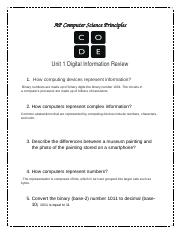AP Computer Science Principles Unit 1 Decoded
So, you're thinking about dipping your toes into the digital ocean? AP Computer Science Principles Unit 1 is like the wading pool of the coding world. It's where you get a feel for the water, splash around with some basic concepts, and hopefully decide you're ready to dive deeper. Seriously, though, this foundational unit sets the stage for the entire course, and believe it or not, it's pretty relevant to your life even if you don't end up coding the next big app.
This introductory unit tackles the very essence of what makes our digital world tick. You'll explore how information is represented, manipulated, and transmitted in the world of computers. Think binary code, data types, and the magic of abstraction. You'll also learn about the internet, its underlying infrastructure, and its pervasive impact on society, both good and bad. Prepare to be enlightened and maybe a little freaked out by how much data is constantly swirling around us.
Unit 1 of AP Computer Science Principles wasn't conjured out of thin air. The College Board developed it as a way to introduce a broader range of students to computer science. It emphasizes computational thinking and big-picture ideas rather than getting bogged down in specific programming languages. The course aims to demystify computer science and show students how it shapes our world, making it more accessible and engaging for everyone, regardless of their prior experience.
One of the key issues this unit addresses is digital literacy. In a world increasingly reliant on technology, understanding the fundamentals of computing is crucial. From evaluating the credibility of online information to understanding the ethical implications of data collection, Unit 1 equips students with the skills to navigate the digital landscape responsibly and critically. It's like getting a decoder ring for the internet age.
Imagine trying to communicate with a computer without a common language. That's where binary code comes in. It's the language of computers, using only 0s and 1s to represent all information. This seemingly simple system is the foundation for everything from your favorite cat videos to complex scientific simulations. Another key concept is abstraction, which is essentially simplifying complex systems by hiding unnecessary details. Think about driving a car; you don't need to know how the engine works to operate the vehicle. Abstraction allows us to interact with technology without needing to understand all the nitty-gritty details.
One major advantage of mastering the concepts in AP Computer Science Principles Unit 1 is that it prepares you for further study in the field. It lays a strong foundation for subsequent units and opens doors to more advanced computer science courses. Another benefit is the development of computational thinking skills, which are valuable in various disciplines, even outside of computer science. Finally, it cultivates digital literacy, empowering you to navigate the digital world safely and effectively.
Advantages and Disadvantages of AP Computer Science Principles Unit 1
| Advantages | Disadvantages |
|---|---|
| Provides a broad introduction to computer science concepts | May not be in-depth enough for students already familiar with coding |
| Emphasizes computational thinking skills | Can be challenging for students with no prior exposure to computing |
| Promotes digital literacy | Requires access to technology and reliable internet |
Frequently Asked Questions about AP Computer Science Principles Unit 1:
1. What is binary code? Answer: A system of representing information using only 0s and 1s.
2. What is abstraction? Answer: Simplifying complex systems by hiding unnecessary details.
3. What is the internet? Answer: A global network of interconnected computers.
4. What is data? Answer: Raw, unorganized facts and figures.
5. Why is digital literacy important? Answer: It helps us navigate the digital world safely and effectively.
6. What are some examples of digital information? Answer: Text, images, audio, and video.
7. How does the internet impact society? Answer: It facilitates communication, commerce, and information access, but also raises privacy and security concerns.
8. What is computational thinking? Answer: A problem-solving approach that involves breaking down problems into smaller, more manageable parts.
In conclusion, AP Computer Science Principles Unit 1 provides a crucial introduction to the world of computer science. It lays the groundwork for further study, develops critical thinking skills, and fosters digital literacy, preparing students for success in an increasingly technology-driven world. From understanding binary code to grasping the complexities of the internet, this unit offers valuable insights into the digital landscape. While it can be challenging for beginners, the benefits of mastering these foundational concepts are undeniable. By engaging with the material and exploring the vast resources available, students can unlock their potential in computer science and beyond. So, take the plunge and dive into the exciting world of Unit 1 – you might just surprise yourself with what you discover.
Finding your perfect honda ridgeline near you
Unleashing creativity the art of graffiti lettering
Discover veranda preserve in east port st lucie













